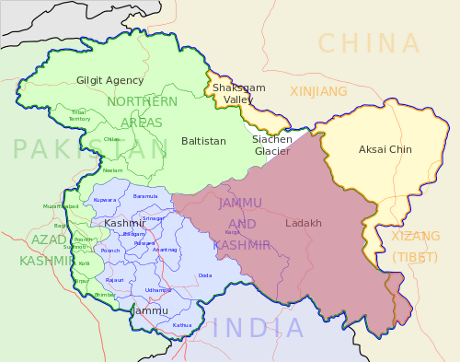
India’s government has flooded the northern state of Jammu & Kashmir with troops and cut off internet access upon announcing Aug. 5 the revocation of its constitutionally protected autonomy, and plans to divide the disputed territory into two new political entities with reduced power. Section 144 of India’s criminal code, imposing emergency measures, has been instated in the capital Srinagar, and two leading opposition politicians in the territory’s legislature, Omar Abdullah of the National Conference and Mehbooba Mufti of the Peoples Democratic Party, have been placed under house arrest.
Article 370 of India’s constitution grants Jammu & Kashmir a high degree of autonomy, a concession to the demands of the territory’s Muslim majority, many of whom favor independence or union with Pakistan. In addition to abrogating Article 370, Delhi announced plans for a bill to divide India-controlled Kashmir into two “union territories,” which have lesser powers of self-government than states. A reduced Jammu & Kashmir Union Territory would continue, at least, to have a legislature. But it would be separated from the Buddhist-majority region of Ladakh, which is to become its own union territory, without a legislature. Complicating matters further is that the populace of Ladakh itself is divided along sectarian and regional lines. News of the plan to separate Ladakh from Jammu & Kashmir was met with jubilation in the principal Buddhist town of Leh, but with foreboding in Kargil, an enclave within Ladakh inhabited by Ismaili Muslims. (India Today, TNW, The Hindu, Times of India)
Pakistan has already broken up its portion of divided Kashmir, separating the “Northern Areas” of Hunza, Gilgit and Baltistan from “Azad Kashmir.” Gilgit is also an Ismaili enclave, where the populace has been agitating for greater autonomy or even independence from Sunni-dominated Pakistan.





Clarification on Article 370
Article 370 is a “temporary, transitional, and special provision” of the constitution that may be abrogated by the executive at any time—although this is the first time that has happened since the charter was drafted in 1949. It is especially controversial for its strictures on non-reisdents of Kashmir buying land in the territory. This has been protested as an expropriation of non-Muslims who have fled Kashmir due to militant activity. The so-called “Kashmiri Pandits“—Hindus exiled from Kashmir—have long been demanding abrogation of the article. (Jurist, Times of India, BBC News, PTI)
Media in India are noting that Delhi took the move immediately after Donald Trump boasted that Prime Minister Narendra Modi had invited him to mediate in the Kashmir dispute—a claim immediately refuted by the Indian government. Critics protested that Trump’s involvement would have violated an India-Pakisan agreement that any solution to the Kashmir question should be arrived at bilaterally. (The Hindu, Politico)
India authorities arrest former Kashmir officials
Indian authorities on Feb. 6 arrested two former top elected officials of Kashmir under the Public Safety Act, a controversial law that allows detention for up to two years without trial. Mehbooba Mufti and Omar Abdullah were arrested following a six-month period of house arrest. The two join thousands of others who have been detained since August, when the Indian government revoked Kashmir’s and Jammu’s constitutional autonomy. (Jurist)
India high court upholds repeal of Kashmir autonomy
The Indian Supreme Court on Dec. 11 upheld the Union government’s 2019 decision to repeal the special status accorded to the state of Jammu & Kashmir under Article 370 of India’s constitution. (Jurist)